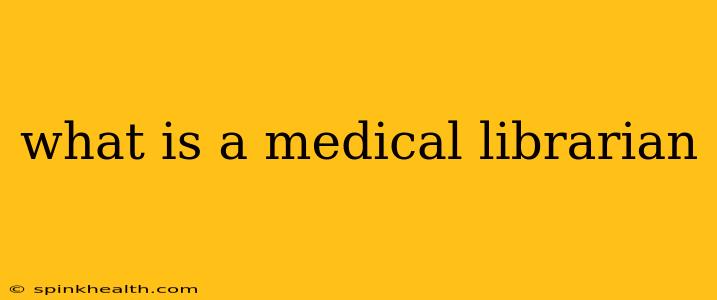What is a Medical Librarian? The Unsung Hero of Healthcare Information
Imagine a world where doctors and researchers couldn't quickly access the latest medical breakthroughs, where crucial patient information was scattered and hard to find, and where evidence-based practices were hampered by a lack of readily available data. That's a world without medical librarians. These dedicated professionals are the unsung heroes of healthcare, quietly working behind the scenes to ensure everyone from medical students to seasoned physicians has access to the information they need, when they need it.
But what exactly does a medical librarian do? It's far more than just shelving books (though that might be a small part of it!). They are information specialists, highly skilled in navigating the complex and ever-evolving landscape of medical literature, databases, and digital resources. Think of them as expert navigators in the vast ocean of healthcare information.
Their work is multifaceted, crucial for both the efficiency and effectiveness of healthcare delivery. Let's delve deeper into their responsibilities.
What are the main responsibilities of a medical librarian?
Medical librarians wear many hats, adapting their skills to the specific needs of their institution. Some common tasks include:
-
Research Support: This is a core function. They help clinicians, researchers, and students locate and evaluate relevant medical literature, guiding them through the intricacies of databases like PubMed, Embase, and Cochrane Library. They can help design search strategies, critically appraise studies, and manage bibliographic information. This is particularly crucial for evidence-based medicine.
-
Information Management: They organize and manage vast collections of print and digital resources, ensuring materials are easily accessible and well-maintained. This includes cataloging, indexing, and archiving information. In the digital age, this also involves managing online databases and digital repositories.
-
Instruction and Training: Medical librarians often conduct workshops and training sessions for medical professionals and students, teaching them how to effectively use databases, search strategies, and evidence-based research methods.
-
Literature Reviews: For researchers, they can assist in conducting thorough and systematic literature reviews, a fundamental step in many research projects.
What skills are needed to become a medical librarian?
Becoming a medical librarian requires a blend of technical skills and soft skills. Here are some key attributes:
-
Advanced knowledge of library and information science: This is often obtained through a Master's degree in Library and Information Science (MLIS) or a related field.
-
Strong research skills: The ability to critically evaluate research studies and effectively search databases is paramount.
-
Medical knowledge: While not requiring a medical degree, a strong understanding of medical terminology and healthcare concepts is essential.
-
Technical proficiency: Fluency in using various databases and software is crucial in the digital age.
-
Excellent communication and interpersonal skills: They need to effectively communicate complex information to diverse audiences.
What types of settings employ medical librarians?
Medical librarians aren't confined to traditional libraries. They work in a variety of settings, including:
-
Hospitals and healthcare systems: Providing research support and information management services.
-
Medical schools and universities: Supporting students, faculty, and researchers.
-
Pharmaceutical companies: Assisting in drug development and research.
-
Government health agencies: Contributing to public health initiatives and research.
How much do medical librarians make?
Salaries vary based on experience, location, and the employer. However, generally, medical librarians earn a competitive salary, reflecting the high level of expertise and responsibility inherent in their work.
Is a medical librarian the same as a health information manager?
No, while both professions deal with health information, their focuses differ significantly. Health information managers primarily focus on the management of patient health records and data privacy, ensuring the accuracy and accessibility of patient medical information within a healthcare system. Medical librarians, on the other hand, focus on the broader field of medical literature, research, and information resources for healthcare professionals and researchers.
In conclusion, medical librarians are vital members of the healthcare ecosystem. Their expertise in navigating the complex world of medical information ensures that healthcare professionals and researchers have the knowledge they need to make informed decisions, provide the best possible care, and advance medical knowledge. They are the silent architects of evidence-based practice and a critical part of the future of healthcare.

